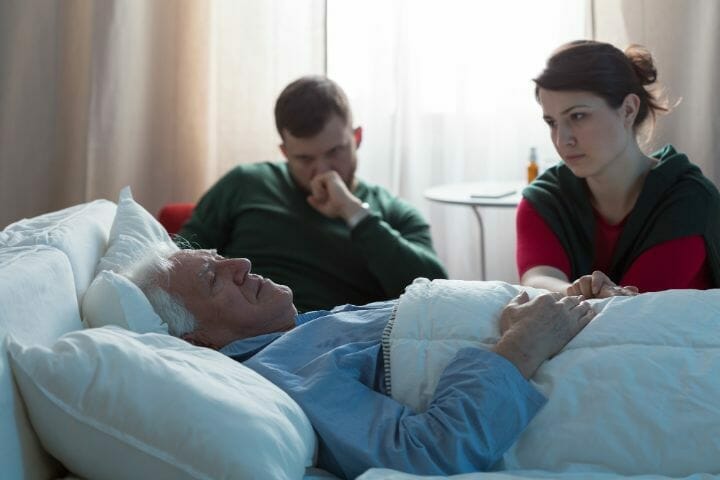If your loved one has dysphagia and is unable to take food and water, you might be wondering “how long can you live without food and water with dementia?” The article below will help you understand what to do in this situation.
Contents
Dementia is a term that talks about the impaired ability of a person to make decisions, think, or remember things that will interfere while doing everyday activities. Dementia can take place in different types, and the commonly reported types are:
- Dementia with Lewy bodies
- Fronto-temporal Dementia
- Vascular Dementia
- Alzheimer’s disease
Symptoms of Dementia:
- Changes in abstract thinking
- Unable to perform simple tasks
- language problems
- Limited spatial skills
- Disorientation
- Loss of initiative
- Loss of memory
Dysphagia and Dementia
Dysphagia is a problem which is associated with swallowing. The reason for this can be many and includes various factors, including damage to the brain parts which control swallowing.
For those who have Dementia, dysphagia is seen to be progressive; as the patient gets older and the disease progresses, the issue appears to aggravate.
Dysphagia may lead to complications from malnutrition, aspiration pneumonia which is a severe chest infection and choking. According to the reports, 9 out of 10 people who have Dementia will experience dysphagia at some point in this phase.
Those who have been suffering from Dementia for a long time can face issues while drinking, eating and slowly will lose the ability to swallow as it aggravates slowly. After some time, their physical and mental health will also deteriorate, making it worse.
We know that it is hard to see when someone develops Dementia and loses their appetite as it gets more challenging for them to swallow liquids and solids, and gradually worsening their condition. It is a difficult time emotionally for the caregivers and family as they try many ways to make the person respond somehow.
It is essential to maintain hope and make them drink and eat in small amounts to nourish the person.
You may also like Best Door Locks For Dementia Patients
How Long Can Someone Live Without Water and Food With Dementia?
It is hard to estimate how many days or hours a person with Dementia who is not eating or drinking lives. Each person is different, and it varies from person to person on how long the patient goes bedridden if they are in the severe stages of Dementia, where it aggravates into the irreversible cognitive decline, and what type of medical treatment they are receiving at that time.
Based on the above factors, it could be weeks to months, days to weeks, or hours to days for the person to live. It is essential to realize that each situation is different, and every individual will respond differently to the treatment.
Fluid intake will have the biggest effect on the survival of the person. Our bodies will tend to have weeks’ worth of energy that is reserved from food stores, but it lacks any fluid reserve, which will cause problems with kidney functioning in a few days. When someone no longer takes any fluid, and if she or he is bedridden (and will need little fluid), the person may live as little as a few days or as long as a couple of weeks.
In a normal process, people lose their sense of thirst or hunger slowly. They may also not be alert to swallow safely. It is a sign that the body system is starting to shut down eventually. Death can be days or hours away. The patient will feel more comfortable when the mouth is moistened, but this will not quench the thirst.
The below question may arise:
Should That Person Be Given Food and Fluids by Mouth?
It is essential that a person who is able to swallow be given sips of liquids and pureed food. They need to be encouraged to do so because it will help in preventing dehydration. It is essential to support them to eat something. It would be good if you did not worry here that they are not eating a balanced diet. You should not restrict them if they want to eat something which they are not supposed to like sweets. Let them eat and enjoy what they crave for during this time.
Tips To Give Food And Water To Your Loved One
- Give small quantities: Always offer small amounts of fluids and foods at regular intervals to the patient. The patient need not consume drinks or eat like a meal, and they can eat whenever they feel receptive to their choices of foods and fluids.
- Food consistency: For this patient, the swallowing issue means that they have to be given food in puree consistency. Whatever you give should be swallowed by them safely and with less effort.
Should You Give ANH (Artificial Nutrition and Hydration)
For a patient to get onto ANH, he will have to be admitted to the hospital, as the ANH procedure requires inserting IV drips or tubes.
It can be distressing for him, and many studies have a report mentioning that one-third of people in the end-stage of Dementia who have been inserted with a tube for the sake of feeding will die within a month after they are administered with ANH.
Those with advanced Dementia have a steep cognitive decline and will not make sense of what is happening in the surroundings. It can result in them pulling their feeding tube drips out, and it can cause infection at the site.
The tube feeding is not recommended because:
- It will not stop the patient from coughing or choking when fluids or food passes through the windpipe
- It will not prolong or improve quality of life.
- It will not minimize the chest infection risks.
- It will not help with the person losing weight.
Caring for people having Dementia or Alzheimer’s at home may be stressful and demanding for the caregiver and the family as it is very stressful. Studies say that depression can be a consequence of those who serve as a caregiver for a prolonged time.
Stress and Fatigue are seen as they will always be on call. We must empathize and understand with the caregivers and the bystanders as they will be witnessing the loved ones on the hospital bed without the food or fluid intake.
You may also like Hydration Balls for Dementia and Elderly Patients
Terminal Restlessness
When a person shows signs of restlessness or near death, it is known as terminal restlessness. Remember that a sign of distress or restlessness is a warning sign of fever and pain, so it is important that it is reported to a nurse or doctor immediately. If there is an infection or fever, the doctor will give medicine so that the patient will feel relieved.
What to Do When a Situation of Terminal Restlessness Occurs?
If you see that the person is restless and they get uncomfortable, you can try by helping them to move into a comfortable position.Meet with the doctor if the patient does not find relief. You may apply a cold compress or use a fan to keep the temperature down. A Doctor may give paracetamol to reduce the temperature. The patient may need additional medication to get relief from the restlessness if the paracetamol does not help.
What does Cheyne-Stoke Breathing Mean?
The breathing pattern of the person will start changing when death approaches. This is because they start going unconscious. This is known as ‘Cheyne-Stoke breathing.’ When they have regular breathing, they can have periods where the breathing stops for a few seconds. He may start breathing faster and may have long gaps in between.
Though the person facing this issue is unaware of this, the family members around can see this, which is distressing. Someone must explain this situation to the family members as they are not aware of this. As a relative or family member, you must understand that this is a natural process and realize that this will not cause any physical pain to the patient.
When it goes to the final stage, bubbly secretions can be seen, which are known as the death rattle. The breathing of the person will sound gurgling and wet here. You can see this occurring in the last few hours or days of the person’s life.
Though it is hard for you to see this, it is a good sign that the person is unaware of this situation. You can change the person’s position at this time by raising his head or turning him to his side and take advice from nurses and doctors to give medication that will dry the secretions. The skin of the person may become clammy and pale.
Fingers and feet may become blue tinges. This happens as the blood flow in the body slows down when death approaches. Even now, the person will not be aware of this situation, so ask the family members to understand this. This is important as it may decrease their distress.
You may also like Foods for Rebuilding Healthy Cartilage and Promoting Healthy Joints
Be Prepared For The End, And Try To Reduce The Pain As Much As Possible.
In the final stage of Dementia, it can get distressing for the caregivers and family members. It is just that they have to remember that it will not cause any physical pain to the patient, and they will be unaware of this till they die.




